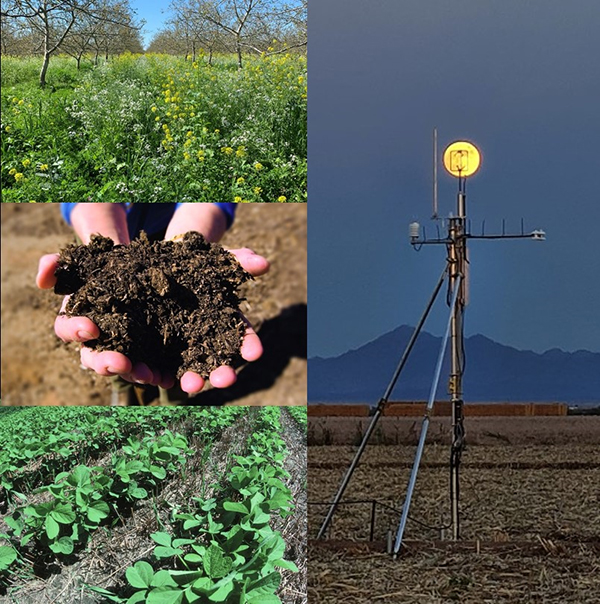ERTH Faculty Receive $6 Million Grant
23 August, 2023
ERTH faculty Drs. John Knowles and Sandrine Matiasek are co-investigators on an awarded $6 million California Climate Action Matching Grant led by Chico State’s Center for Regenerative Agriculture and Resilient Systems (CRARS). In total, over $80 million in Climate Action Grants were awarded to support 38 projects (including 11 at CSU campuses) focused on the implementation of solutions that directly address California’s climate priorities.
 Project lead and CRARS director Dr. Cindy Daley said the funds will be instrumental to advancing the University’s climate goals:
Project lead and CRARS director Dr. Cindy Daley said the funds will be instrumental to advancing the University’s climate goals:
“Climate change is upon us, and no one feels the effects more than production agriculture,” Daley said. “It’s imperative that we develop more effective farming strategies that build resilience for future food security and create a climate-literate workforce, with the skills and knowledge to manage these changes into the future.”
ERTH faculty Knowles and Matiasek will chiefly contribute to the Soil Carbon Accrual Project (SCAP) project component that is designed to address soil degradation, erosion, and diminished water availability, all critical issues facing California agriculture. In addition, partnership with the Modoc Nation will expand the project scope to evaluate the carbon accrual potential of cultural resource management in California’s North State.
The SCAP will specifically compare carbon cycling associated with the standard or conventional farming system (full tillage; herbicide; fertilizers; pesticides; no cover) to a regenerative farming system (cover crops; no-till or conservation till; crop rotations) using eddy covariance towers, soil chambers, lysimeters, DNA probes, and other cutting edge technologies to quantify the impacts on soil carbon accrual, soil microbial diversity, water use efficiency, and economic return.
In particular, the eddy covariance “flux tower” technology is an important project capability:
“These will allow us to monitor the ‘breathing’ of agricultural systems in real-time,” said ERTH assistant professor John Knowles. “We’ll specifically use paired towers to test how regenerative vs. conventional management practices affect the potential for these systems to function as carbon sinks that remove and store CO2 from the atmosphere, which has huge implications for climate change.”
ERTH associate professor Sandrine Matiasek is excited to evaluate how regenerative practices affect water quality and water use. “The carbon and water cycles are interconnected. Changing agricultural practices to sequester carbon in soil also has the potential to improve water use efficiency and water quality, but these benefits largely remain undocumented.”
The interdisciplinary project is a collaborative effort with Chico State co-investigators Drs. Garrett Liles, Logan Smith, and Jake Brimlow from the College of Agriculture as well as Dr. Patty Oikawa from CSU East Bay. Other project collaborators include the Chico State Geographical Information Center, the California Association of Resource Conservation Service, the Carbon Cycle Institute, Buzz’s Bees, the Honeybee Discovery Center, and farmer partners in California’s Sacramento, San Joaquin, and Palo Verde valleys including the Chico State University Farm.
Photo credits: Jason Halley and the Chico State Center for Regenerative Agriculture and Resilient Systems
